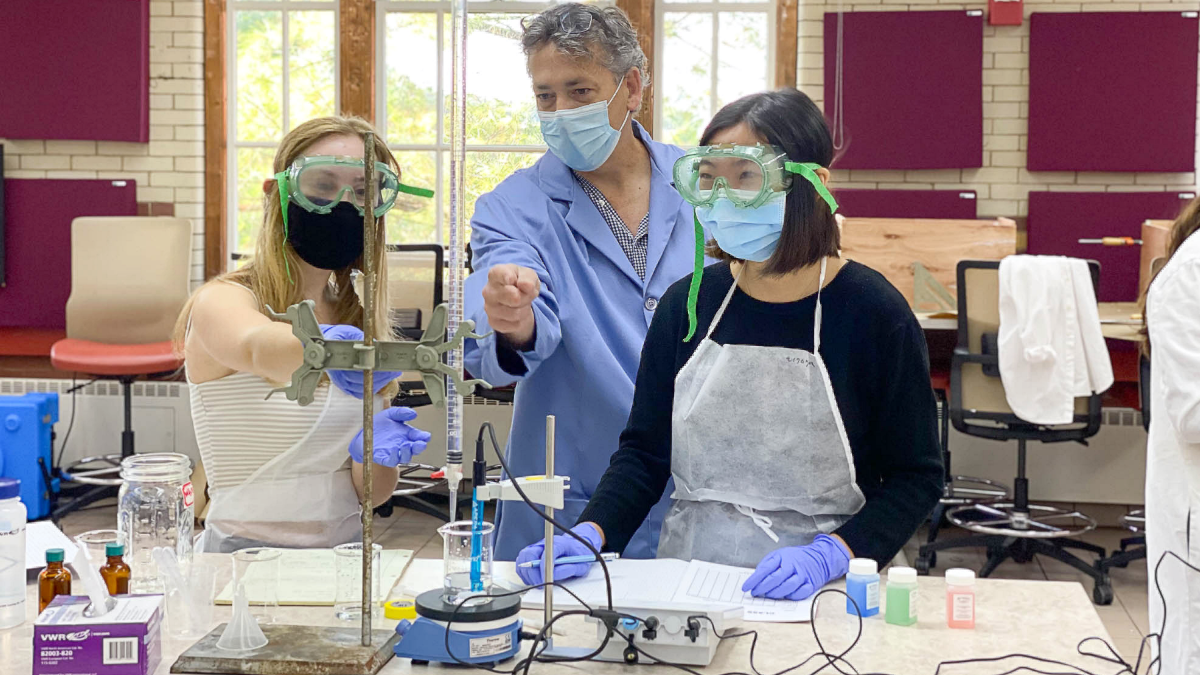
The Evolution of CEE: Preparing the Next Generation of Engineers and Problem Solvers
CEE’s latest initiatives have included the launch of an Environmental Engineering bachelor’s program, new lab courses for Civil Engineering undergraduates, a stronger emphasis on sensors in design courses, and a growing focus on diversity, equity, and inclusion. Overseen by Department Head Dave Dzombak, our faculty and staff are equipping students to become skilled problem-solvers, critical thinkers, and industry leaders who apply a deep understanding of CEE principles, technology, and tools to make communities around the world safer, more equitable, and more inclusive for all.
Part 1 // Part 2 // Part 3 // Part 4
The Start of a New Era for Environmental Engineering in CEE
Environmental engineering has long been a mainstay of CEE’s undergraduate curriculum, and the November 2020 announcement of a new BS in Environmental Engineering (EnvE) program reflected expanded commitment to preparing graduates to make an impact in this critical field.
Now, our first cohort of EnvE majors have begun the program’s curriculum, including completing a new Environmental Chemistry and Thermodynamics course and Environmental Chemistry lab in the fall.
 “We’ve already started to talk about real-world solutions,” EnvE sophomore Nico Bosquet shares.“What I had learned in chemistry in the past was built upon and given real-world environmental context. It’s nice to see how what we’re learning is used by professional environmental engineers.”
“We’ve already started to talk about real-world solutions,” EnvE sophomore Nico Bosquet shares.“What I had learned in chemistry in the past was built upon and given real-world environmental context. It’s nice to see how what we’re learning is used by professional environmental engineers.”
 Katrina D’Arms, another EnvE sophomore, agrees. “Our professors care a lot about us not only learning the material, but also learning the applications.” D’Arms also appreciates that, beyond simply talking about sustainability, CEE faculty and staff put their beliefs into practice.
Katrina D’Arms, another EnvE sophomore, agrees. “Our professors care a lot about us not only learning the material, but also learning the applications.” D’Arms also appreciates that, beyond simply talking about sustainability, CEE faculty and staff put their beliefs into practice.
“There’s a point-of-use drinking water treatment system inside the department that was designed by a student, and composting is also really encouraged,” she says. “It’s cool to be in a place that has the same values I do.”
For D’Arms and Bosquet, another important program feature is that the EnvE students share several courses with their CivE peers, including the four-year project course sequence. Between these classes and the shared departmental space, both groups interact frequently and the department has maintained its strong sense of community.
While the current EnvE students still have two years before graduation, the future is already on their minds. D’Arms did research last summer modeling energy decarbonization scenarios--and recently she’s become interested in learning about sustainable building design in upcoming courses. With a Global Engineering minor, Bosquet hopes to become an environmental engineer in Europe. Having interned with a solar company this summer, he may maintain a focus on energy, but he also developed an interest in water quality during the fall Environmental Chemistry course.
Wherever they decide to make their marks, Bosquet, D’Arms, and their fellow EnvE classmates are all on track to set a strong standard for the next CEE students and environmental engineers who follow in their footsteps.